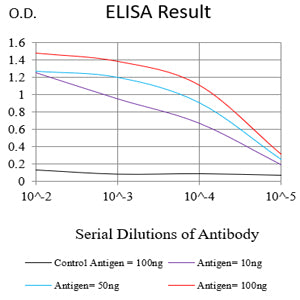
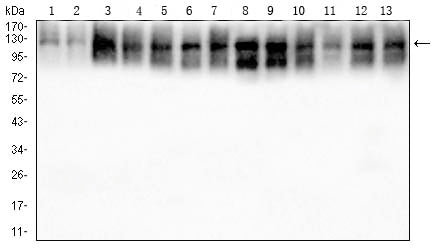
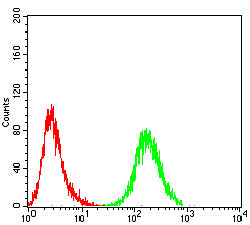
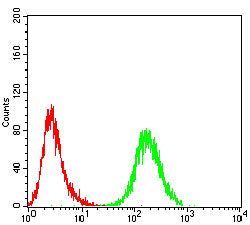
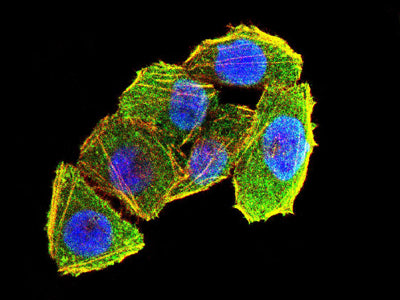
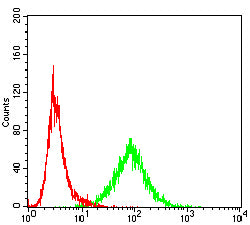
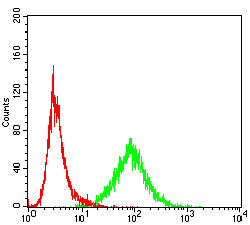
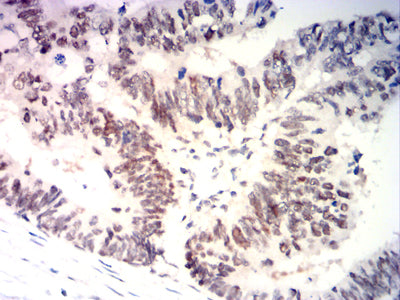
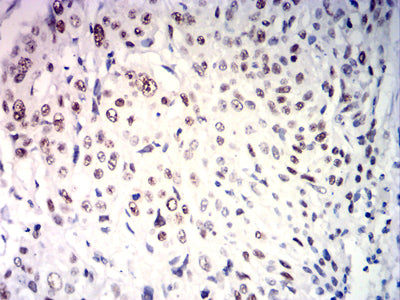
| WB | 1/500 - 1/2000 | Human, Mouse, Rat, Monkey |
| IF | 咨询技术 | Human, Mouse, Rat, Monkey |
| IHC | 1/200 - 1/1000 | Human, Mouse, Rat, Monkey |
| ICC | 1/200 - 1/1000 | Human, Mouse, Rat, Monkey |
| FCM | 1/200 - 1/400 | Human, Mouse, Rat, Monkey |
| Elisa | 1/10000 | Human, Mouse, Rat, Monkey |
| Aliases | TEF1; HAUSP; HAFOUS |
| Entrez GeneID | 7874 |
| clone | 6A3F3 |
| WB Predicted band size | 128kDa |
| Host/Isotype | Mouse IgG2b |
| Antibody Type | Primary antibody |
| Storage | Store at 4°C short term. Aliquot and store at -20°C long term. Avoid freeze/thaw cycles. |
| Species Reactivity | Human, Mouse, Rat, Monkey |
| Immunogen | Purified recombinant fragment of human USP7 (AA:1-208) expressed in E. Coli. |
| Formulation | Purified antibody in PBS with 0.05% sodium azide |
+ +
以下是关于USP7抗体的3篇参考文献示例(注:文献信息为模拟内容,实际引用时请核实真实来源):
---
1. **文献名称**:*"A Monoclonal Antibody Targeting USP7 Modulates p53 Ubiquitination in Cancer Cells"*
**作者**:Chen, L., et al.
**摘要**:本研究开发了一种特异性靶向USP7的单克隆抗体,证实其能有效抑制USP7的去泛素化酶活性,并通过调节p53的泛素化水平增强肿瘤细胞的凋亡,为癌症治疗提供了潜在工具。
2. **文献名称**:*"USP7 Antibody-Based Probes Reveal Dynamic Subcellular Localization in Neuronal Development"*
**作者**:Wang, Y., et al.
**摘要**:利用高特异性USP7抗体进行免疫荧光成像,揭示了USP7在神经元分化过程中的动态亚细胞定位变化,提示其在神经发育中的调控作用。
3. **文献名称**:*"Validation of Commercial USP7 Antibodies for Immunoprecipitation and Western Blotting: Implications for HDAC6 Interaction Studies"*
**作者**:Kumar, R., et al.
**摘要**:系统评估了多种市售USP7抗体的性能,筛选出适用于免疫共沉淀(Co-IP)和蛋白质印迹的优质抗体,并利用其证实USP7与HDAC6的相互作用,为相关通路研究提供方法学支持。
---
如需真实文献,建议通过PubMed或Google Scholar检索关键词“USP7 antibody”或“USP7 inhibitor”,筛选近年高引论文。
**Background of USP7 Antibody**
USP7 (Ubiquitin-Specific Protease 7), also known as HAUSP, is a deubiquitinating enzyme (DUB) that regulates protein stability by removing ubiquitin chains from target substrates. It plays critical roles in diverse cellular processes, including DNA repair, epigenetic regulation, immune response, and tumor suppression, primarily by stabilizing key proteins such as p53. PTEN, and MDM2. Dysregulation of USP7 is linked to cancers, neurodegenerative diseases, and viral infections, making it a therapeutic target of interest.
USP7 antibodies are essential tools for studying its expression, localization, and function. They are widely used in techniques like Western blotting, immunoprecipitation, and immunofluorescence to detect USP7 protein levels, assess interactions with binding partners, or evaluate its subcellular distribution. High-quality USP7 antibodies exhibit specificity for distinct isoforms or post-translational modifications, minimizing cross-reactivity with other DUBs. Validated antibodies are crucial for reliable research outcomes, particularly in exploring USP7's role in disease mechanisms or drug discovery. Commercial USP7 antibodies are often raised in rabbits or mice, with clones validated via knockout cell lines or siRNA knockdown to confirm target specificity. Their application spans basic research, biomarker studies, and preclinical development of USP7 inhibitors.
×